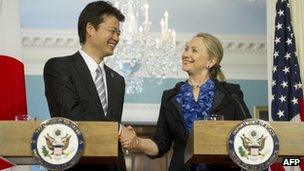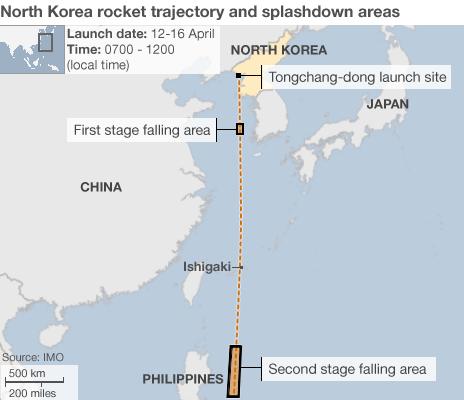North Korea should not launch rocket - Hillary Clinton
- Published
The US Secretary of State, Hillary Clinton, has said North Korea should not go ahead with its planned rocket launch if it wants a "peaceful, better future" for its people.
Mrs Clinton said the launch would be a direct threat to regional security.
Meanwhile the US ambassador to the UN said the Security Council would have to respond swiftly and credibly if the launch goes ahead.
Susan Rice said members had discussed informally what steps could be taken.
A North Korean official has dismissed concerns that the launch is a cover for developing missile technology as "nonsense".
North Korea says that the launch - scheduled to take place between 12 and 16 April - is part of the peaceful development of a space programme, and will mark the 100th anniversary of the birth of its late leader Kim Il-sung.
'Provocative act'
Mrs Clinton, speaking after talks with Japanese Foreign Minister Koichiro Gemba, said the planned launch would violate North Korea's obligations under existing UN Security Council resolutions.
Both diplomats talked of "appropriate action" if the launch goes ahead.
Ms Rice said there was "no disagreement among members of the council that this is a provocative act, and an act that the North Koreans should refrain from undertaking".

Mrs Clinton and Mr Gemba said "appropriate action" would be taken if the launch went ahead
Japan and South Korea have warned they will shoot the rocket down if it threatens their territory.
Airlines in the region have announced route changes to avoid the rocket's trajectory.
North Korea said on Tuesday that the launch of the rocket was on target to go ahead as scheduled. The Unha-3 rocket is to launch a satellite into space, which will be used for weather forecasts, it says.
On Sunday, officials invited foreign journalists to the Sohae satellite station at Tongchang-ri, on the country's north-west coast. All three stages of the rocket were visibly in position at the launch pad.
Pyongyang had agreed in February to a partial freeze in nuclear activities and a missile test moratorium in return for US food aid. But that deal was put on hold last month after the North announced its rocket launch plans.

- Published10 April 2012